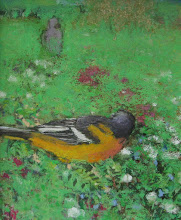Lorrie Moore writes, with some passages of woman-bird transmergence, about a breakup at the end of her story, "
Willing." Haughty, distressed Sidra gives up on a waffling Walter. The tawdry scene is relieved for us by the words themselves. Gosh.
She sat down on the piano bench. Something dark and coagulated moved through her, up from the feet. Something light and breathing fled through her head, the house of her plastic-wrapped and burned down to tar. She heard him give a moan, and some fleeing hope in her, surrounded but alive on the roof, said perhaps he would beg her forgiveness. Promise to be a new man. She might find him attractive as a new, begging man. Though at some point, he would have to stop begging. He would just have to be normal. And then she would dislike him again.
He stayed on the sofa, did not move to comfort or be comforted, and the darkness in her cleaned her out, hollowed her like acid or a wind. . . .
. . . he was saying. But she was already turning into something else, a bird--a flamingo, a hawk, a flamingo-hawk--and was flying up and away, toward the filmy pane of the window, then back again, circling, meanly, with a squint. . . . and she was gone, gone out the window, gone, gone.
Lorrie Moore's book of short stories where "Willing" appears is titled Birds of America.











No comments:
Post a Comment